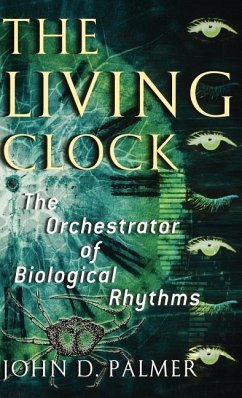From one-celled paramecium to giant blue whales, we all have internal clocks that regulate the rhythms we live by. In The Living Clock, John Palmer, one of the world's leading authorities on these rhythms, takes us on a tour of this broad and multifaceted subject, examining everything from glowing fruit flies to the best cures for jet lag. Palmer has a wonderful sense of humor and an eye for the startling fact. We learn that fiddler crabs--in a lab where there are no time nor tide cues--remain active when low tide would occur and motionless during high tide, the same pattern they follow in their natural habitat. (In fact, you can remove a crab's leg and the leg will keep a tidal rhythm as long as it's kept alive.) Moreover, humans are subject to more than one hundred biological rhythms. Mental acuity peaks in the afternoon, for instance, and our blood pressure peaks at seven in the morning (when most heart attacks occur). The time of day you take medication can affect how well it works. And Palmer shows that when our clocks are thrown off kilter, trouble follows, especially for rotating shift workers--the Bhopal spill, the Chernobyl reactor explosion, and the Three Mile Island accident all happened when new crews began early-hour shifts. No one has discovered exactly how our internal clocks work--Palmer says a Nobel Prize awaits that lucky scientist--but they are no less fascinating for their inexplicable nature. Frequently amusing and always eye-opening, The Living Clock is a treat for everyone curious about the nature of life as well as anyone planning a long jet flight.
Hinweis: Dieser Artikel kann nur an eine deutsche Lieferadresse ausgeliefert werden.
Hinweis: Dieser Artikel kann nur an eine deutsche Lieferadresse ausgeliefert werden.








